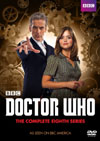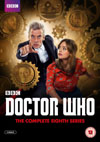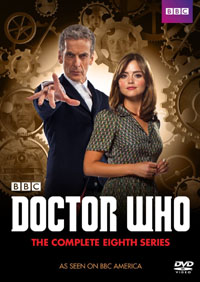DVD Extras for this story include:
The entire threat to Earth, and indeed the only means by which Human beings know that there is something mysterious to be investigated on the moon, comes through the idea that the moon's gravity has increased enormously. That is a fascinating question, and had me hooked. But note that the entire mystery is now predicated upon science, so the episode MUST use science believably to remain satisfying. I'm not sure to what degree production convenience weighed into the decision about how much the moon's gravity should increase, but since the episode is shot in Earth's gravity, nothing special would need to be done with the actors on set if the moon's gravity increased to about six times its normal factor, which appears to be the case. 600% is a HUGE amount, and we're definitely in that ball park in this episode. So, anyway, this is sci-fi, and there could be many unknowns coming into play to make this credible, areas where writers have control and can exercise creative freedom. In actual fact, Capaldi's Doctor rattles off a few possibilities early on here, pretty much all of which would be more plausible than what is eventually revealed as the episode's "truth". Personally, as I watched, I kept in mind the fact that 21 years after this adventure takes place, the Patrick Troughton story "The Moonbase" (story no. 33) will occur. Not only will the moon be there, but it will also be home to a "gravitron", a device manned by Human beings to stabilize and improve Earth's weather. Were we about to discover some technology in this episode that would make the development of the gravitron easier, or more practical? Would such a device feed off of some unknown factor unique to this moon? I was intensely curious to discover a good, scientifically plausible answer, and that curiosity generated a good drive to the mystery. Concepts of a hollow moon, and aliens living on the moon and staking claim to it, aliens sometimes described as insectoid, have also popped up before both in and outside of fiction. H.G. Wells wrote a book later turned into a film in the 1960's called "First Men In the Moon", which nicely encapsulated these ideas. Not bad concepts to revisit on Doctor Who, if this story had wanted to go in that direction. Now the story's indigenous Human astronauts and the entire mission control team that sent them to the moon appear to be complete idiots in their attempts to deal with a gravitational threat using nothing more than a massive collection of nuclear devices. Such devices can't actually destroy much more mass than the few atoms at their core. All they can hope to do to the moon's mass is just break it up, irradiate it terribly, and send it in unwanted directions. All that really happens here is that the astronauts and mission control people totally fail as convincing characters who have earned their scientific positions. Compounding this is the big kicker - the only answer to this gravitational mystery offered by the episode is that, unbeknownst to Mankind, our moon is actually an egg that is just now about to hatch after incubating for hundreds of millions of years. Well, we do know a thing or two about eggs. They don't maintain the same mass throughout their entire incubation period, and then suddenly increase in mass by 600% just before hatching. Typically, a freshly laid egg contains a tiny embryo and a ton of food for the embryo. During incubation the mass of the food is gradually converted into the mass of the growing fetus. In fact, there is probably a slight decrease in mass as some of it is used up in chemical reactions and the embryo starts to move around a bit. We know the moon has had a fairly stable mass for all the hundreds of millions or billions of years it's been orbiting our Earth. How can we explain away the fact that in no more than a few decades it would not just double, not just triple, but multiply its mass by six, simply by being a giant alien egg? It's ridiculous. Without coming up with some outrageous new mechanism, like sprouting solar panel wings to convert the sun's energy into the creature's body mass (and even that is hardly credible to cover the amount of mass required in such a short period of time), the episode totally fails to answer its primary mystery satisfactorily. Compounding this is the idea that it is merely the movement of the creature within its egg that causes Courtney to fly upwards in an apparently zero-G room, while the Doctor and company in the next room continue to experience Earth-normal gravity... on the moon. It's really badly laughable.
Because none of this makes ANY sense anymore, there's really nothing left to do but throw our hands up and give up on any hope of thinking through this problem anymore. It doesn't really feel like there's any point to the main debate, since they have neither identified their real problem nor come up with a possible effective solution. It's all still moot. The main debate itself is revealed as a hollow contrivance on the part of the writers. And at that point, we can correctly guess that the writers will take the lazy way out and reach for a great big reset button, which they do. All the broken pieces of the moon neatly pulverize themselves and vanish, and the creature is somehow miraculously at the correct point in its extremely long life span to maturely lay a replacement egg in just the right orbit with just exactly the right amount of gravity to suit us.
In fact, it is probably yet another stretch to believe that widespread power outages hadn't knocked out most lights already. And using this method with a time limit of only 45 minutes, the half of the world still in daylight remains ineligible to vote. I don't know how we are expected to believe that Clara and Courtney were the only Humans who wanted to spare the creature, and that this entire trip was some kind of destiny. Really silly. Now considering this story concept from the angle that the big debate is the important thing to preserve, and to promote the concept that huge creatures spawning from moon-sized eggs are wonders of the universe to be respected and in awe of, the natural way to do this right seems to me to set the story on a distant moon around some alien planet far beyond the range of Earth's telescopes, where the writer has all the elements under his control and can exercise as much freedom as he wants. We could have stayed real with respect to gravity, and with the actual consequences to the planet. No reset button required. Even pulling this off with either Phobos or Deimos, the TINY moons of Mars, would have been a massive improvement in believability, with no need to immediately lay "the next egg". And of course, the episode title is of similar bad taste to the ones I objected to back in season 32, so that deserves a change as well.
And none of the other characters are really much better. Exactly how are they supposed to be impressive when demanding that the Doctor should be something other than the alien that he is? How impressive is the character Courtney to demand that an adult (and a complete stranger at that) tell her that she's special? I have to say, this adventure really didn't do anything to help me like the character of Courtney, or want to see her on any further adventures. "Big for her boots", scary, and not very nice - as actress Ellis George described the character herself in her interview for the previous episode, which is probably not someone I'd particularly want to be friends with, or to want to see on the TARDIS.
I will say that in many ways this ending reminds me of very similar debates between the first Doctor and Barbara Wright in "The Edge of Destruction" (story no. 3), which worked much better for me. William Hartnell similarly went to a strange place, but the character was still much better balanced in writing and performance. Jenna Coleman and Jacqueline Hill both do equally well in standing up to a bad Doctor in their performances, but I find it easier to stay on side with Barbara than with Clara here.
International Titles:Français: "La Première Femme sur la Lune"The French improved nicely on this episode's title, making it: "The First Woman on the Moon"
This story is available on DVD and Blu-ray:
Comments on this article are welcome. You may contact the author from this page:
|











